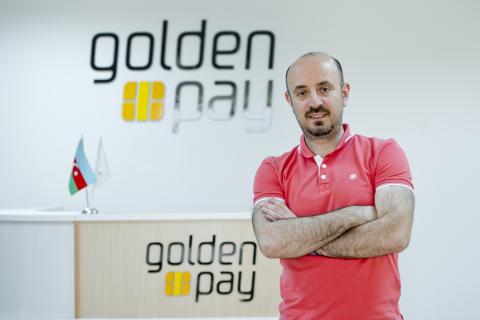Eleven years ago, Farid Ismayilzada founded ‘GoldenPay’, an online payment processing service for Azerbaijan. Returning from the United States where he’d been working at the time, he spotted a business opportunity when he realised that online trading, shopping or payments were not available in his home country.
“For me, it was an opportunity to set up business and as soon as I discovered it, I looked into its potential and eventually made up my mind to come back to Baku and embarked on this challenge,” says Ismayilzada.
At the time, Ismayilzada recalls, “GoldenPay was just a small start-up established by 3 or 4 people in my home. Today, as you see, we have more than 30 employees working in our office.” Since then, with support from EU4Business and the European Bank for Reconstruction and Development (EBRD), the company has set up an online payment platform Hesab.az, has plans to issue its own payment card with Pasha Bank, and to issue its own point of service terminals at trade and service centres.
The company grew fast, but its business structures couldn’t keep pace. “When we started this project, our team consisted of just 15 people. We were not a cooperative; neither offices nor departments were available,” says Ismayilzada. “Everyone was in charge of everything; we did not develop any standards. It was down to individuals, without any process, and whenever someone left, we didn’t know how to manage.”
That was the point at which EU4Business and the EBRD stepped in, with its EU-funded Advice for Small Business programme. The EBRD assessed the situation, and provided a Danish consultant to help the company reorganise the way it worked.
Visiting the company ten times over a period of two years, the consultant transformed its structure. “We managed to convert our company from a small start-up mentality into a corporate mentality,” says Ismayilzada. “So, the structure of the company was developed, with a Board of Directors and departments. Now everybody had his or her own responsibility to fulfil. A well-established system emerged which paved the way for customers to enjoy higher quality and quicker service. The company started to implement its projects in a quality manner.”
GoldenPay and Hesab.az have come to dominate the market: “Our company accounts for 75% of the country's online market. The company following us in 2nd place is 10 times smaller than us,” says Ismayilzada.
But the company’s founder still sees room to improve: there are up to 5 million cards in Azerbaijan, but only 150,000-200,000 cards in total are used in non-cash transactions. “People lack confidence,” he says: “As soon as they get their wages, they dash to withdraw the money from bank accounts. People stand in long queues in front of ATMs in order to get their wages or pensions.” His mission is to change mentalities, to make people realise that the cash on their cards is safer than in their pocket, that even if their cards are hacked, cards are insured and they will get their money back, whereas if cash is stolen, they will never see it again.
Ismayilzada dreams of a cash-free society: “We consider all cash operations as a rival. Payment to the post office is cash, payment at a bank branch or kiosk are cash operations. They are all rivals. Sure, we would like to have no cash operations in our country.” And as mentalities change, Hesab.az is in pole position to take advantage, as a platform where all transactions have been brought together, allowing users to make payments via web and mobile applications.
The EU’s and and EBRD’s support has played a key role in giving the company the means to match its ambition. The consultancy cost €60,000, only 10% of which was paid by the company, the rest being covered through EU funding. And Ismayilzada has not looked back: “We have grown stronger, have grown up, thought about expanding abroad, have settled our financial situation, budget better, have better control over our costs, and have selected better managers.”
******
This article is prepared for the EU4Business initiative and published in the local press: RAKUS, Big.az and Palitranews.az.

